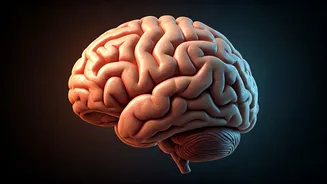Energy Source Shift
During the initial hours of a 36-hour fast, the body primarily utilizes glucose, which is the sugar it derives from the food you consume. However, as food intake
ceases, and time progresses, your body initiates a strategic shift in its energy-obtaining mechanism. Liver glycogen stores are the first to be tapped into; these provide a readily available supply of glucose. After about 12-24 hours of fasting, these glycogen stores dwindle, signifying a crucial turning point. When glucose from both food and the liver is depleted, the body transitions to an alternate pathway, namely, burning stored fat for energy. This is a critical metabolic switch, where fat cells release fatty acids that the liver transforms into ketones. These ketones become the primary fuel source for many organs, including the brain. This energy source shift is a fundamental aspect of the benefits associated with fasting.
Fat Burning Unveiled
As the body's glycogen reserves become depleted, the process of burning fat, or lipolysis, gains momentum. The neurosurgeon pointed out that the body actively targets fat stores, breaking them down into fatty acids and glycerol. These fatty acids are then transported to the liver, where they're transformed into ketones. Ketones, unlike glucose, offer several advantages. They are a highly efficient fuel source, and the brain can readily use them. The increased levels of ketones not only facilitate energy production but also can have a notable effect on mental clarity and cognitive function. This phase of fat burning is a major reason why fasting is often associated with weight loss. However, it's essential to remember that weight loss isn't the sole aim, as this process also triggers many other beneficial effects throughout the body.
Cellular Repair Initiated
One of the most remarkable benefits of a 36-hour fast is the initiation of cellular repair and rejuvenation. As the body is not occupied with digesting and metabolizing food, it shifts its focus toward cellular maintenance and repair. This process includes autophagy, in which cells begin to break down and recycle damaged cellular components. This cellular ‘housekeeping’ clears out dysfunctional cells, allowing for more efficient cell function and renewal. Autophagy is not only essential for maintaining cellular health but also has been linked to the prevention of several age-related diseases. During fasting, the body also becomes more efficient in repairing damaged DNA and promoting overall cellular health. This restorative process is an integral part of why fasting can contribute to long-term health and well-being.
Hormonal Balance Shift
Fasting significantly impacts hormonal balance, particularly with regard to insulin and growth hormone. The absence of food intake leads to a significant decrease in insulin levels. Insulin is a hormone that facilitates the uptake of glucose into cells. When insulin is low, the body is more likely to burn fat for energy, as mentioned earlier. At the same time, fasting boosts the production of growth hormone. Growth hormone plays a crucial role in promoting muscle growth, repairing tissues, and improving metabolism. Increased growth hormone levels, combined with the reduction in insulin, create an environment that's highly conducive to fat loss and the preservation of lean muscle mass. These hormonal shifts are key to many of the metabolic and health benefits associated with a 36-hour fast.
Brain's Enhanced Function
The brain benefits significantly from the metabolic adaptations that occur during fasting. As the body switches to using ketones as a primary fuel source, the brain’s function often improves. Ketones are an extremely efficient energy source for the brain, and they can cross the blood-brain barrier more easily than glucose. This enhanced energy supply can lead to improved cognitive function, including better focus, clarity, and memory. Fasting also supports the production of brain-derived neurotrophic factor (BDNF), a protein that promotes the growth and survival of brain cells. Increased BDNF levels have been linked to improved mood, reduced risk of neurodegenerative diseases, and enhanced overall brain health. This makes a 36-hour fast beneficial not only for physical health but also for the brain.
Important Considerations
While a 36-hour fast offers numerous potential benefits, it is crucial to approach it with caution and awareness. It is always wise to consult with a healthcare professional before starting any fasting regimen, especially if you have pre-existing health conditions, are taking medications, or are pregnant or breastfeeding. Adequate hydration is important during the fasting period. It is recommended to drink plenty of water to prevent dehydration. Additionally, it is essential to listen to your body and discontinue the fast if you experience any adverse symptoms. The transition back to eating after fasting should be gradual, focusing on easily digestible foods. This approach minimizes the risk of digestive discomfort and optimizes the benefits of the fast.













